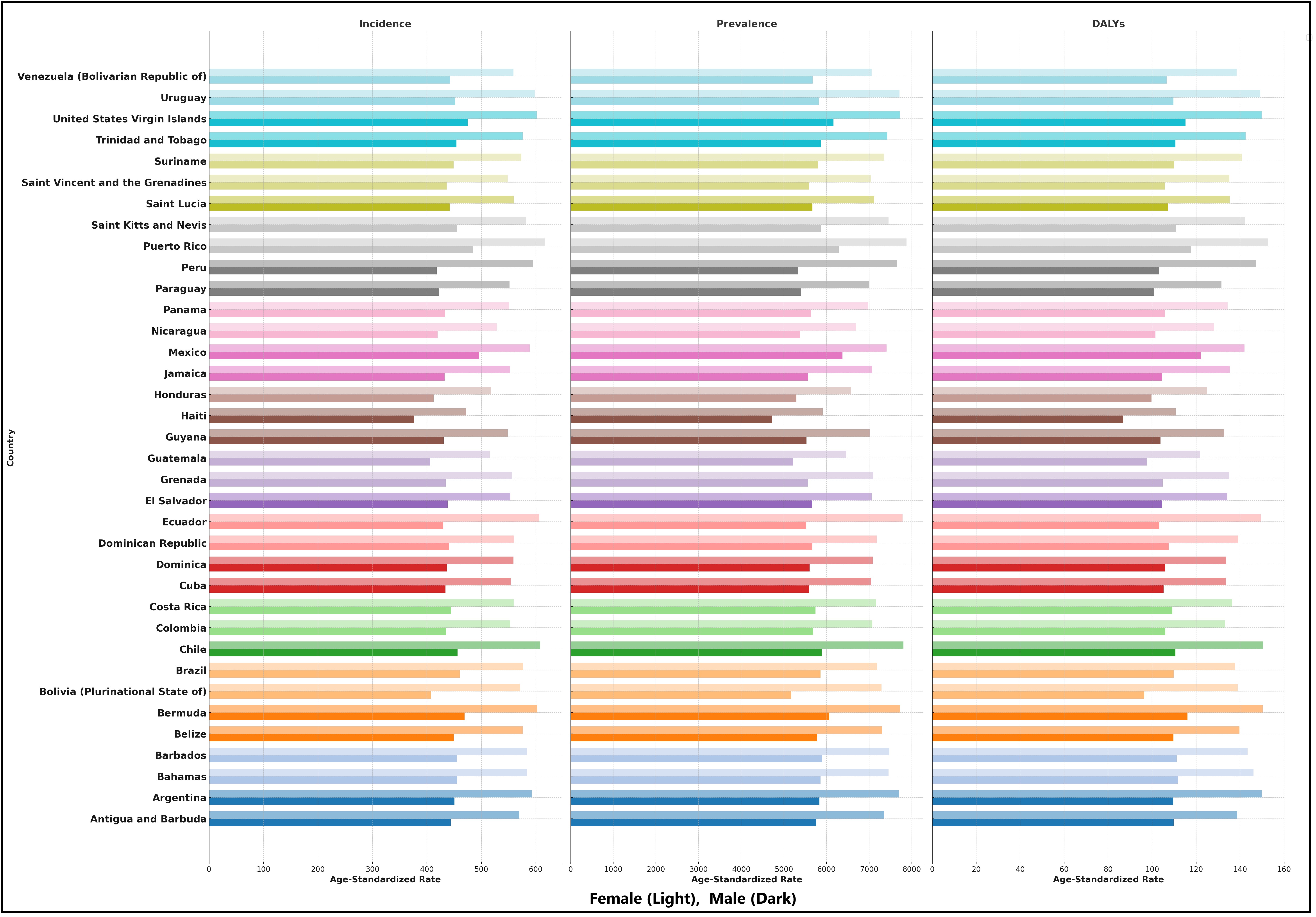Session Information
Session Type: Poster Session A
Session Time: 10:30AM-12:30PM
Background/Purpose: Osteoarthritis (OA) poses a significant and escalating health challenge across Latin America and the Caribbean (LAC), driven by demographic shifts, lifestyle factors, and varying access to healthcare. This chronic condition not only diminishes quality of life due to pain and limited mobility but also strains healthcare resources and imposes substantial economic burdens. Our study spans three decades, incorporating the initial impacts of the COVID-19 pandemic, to comprehensively assess OA’s burden and inform targeted interventions in the region.
Methods: We estimated prevalence, incidence, disability adjusted life years (DALYs) due to OA by age, sex, year and location across the LAC from 1990-2021 by using global burden of disease framework. Non-fatal health outcomes were estimated using DISMOD MR 2.1, a meta regression tool.
Results: From 1990 to 2021, the prevalence of osteoarthritis (OA) exhibited significant increases across various types: OA hip rose from 718,252 (95% Uncertainty Interval: 554,170-915,546) to 2.2 million (1.7-2.9 million), OA hand from 4.7 million (3.5-6 million) to 16.4 million (12.4-20.9 million), and OA knee from 9.2 million (7.9-10.5 million) to 28.3 million (24.3-32.3 million). The age-standardized incidence rate (ASIR) showed the highest total percentage change (TPC) in Panama at 14%, while Bermuda saw the lowest increase at 4% during the same period. In terms of disability-adjusted life years (DALYs) rate (ASDALR), the highest increases were observed in Panama (16%), Mexico (16%), Belize (15%), and Nicaragua (15%) from 1990 to 2021. Regarding specific OA types, the highest ASDALR were observed in Uruguay for OA hip (30%), Argentina for OA knee (29%), and Mexico for OA hand (34%), with significant increases in Panama, Peru, and Haiti following closely. In terms of age, the highest incidence rates were observed in the 50-54 age group (624,287; 95% UI: 498,446-758,368), while the highest DALYs were found in the 60-64 age group (253,717; 95% UI: 124,051-505,055) in 2021. Females generally experienced a higher burden increase compared to males, with total prevalent count increasing by 225% versus 197%, incidence by 195% versus 176%, and DALYs by 230% versus 200% from 1990 to 2021.
Conclusion: Prevalence due to OA accounted for 8.16% of all causes of prevalence in LAC. The study highlights substantial increases in osteoarthritis prevalence and burden across various types in Latin America and the Caribbean from 1990 to 2021. These trends reveal significant disparities in age-specific incidence rates and gender differences, underscoring the pressing need for targeted healthcare interventions to alleviate the growing impact of OA on public health and healthcare systems in the region.
To cite this abstract in AMA style:
rathod m, Kalra E, Sanchez-Dopazo, R, Vala J, Syed S, Sharma A, Shandilya A, Gera A, Lakkimsetti M, Patel J, AMIN V, Desai H. Cross Country Burden of Osteoarthritis in Latin America and Caribbean from 1990-2021: A Comparative and Consistent Benchmarking Analysis for the Global Burden of Disease Study 2022 [abstract]. Arthritis Rheumatol. 2024; 76 (suppl 9). https://acrabstracts.org/abstract/cross-country-burden-of-osteoarthritis-in-latin-america-and-caribbean-from-1990-2021-a-comparative-and-consistent-benchmarking-analysis-for-the-global-burden-of-disease-study-2022/. Accessed .« Back to ACR Convergence 2024
ACR Meeting Abstracts - https://acrabstracts.org/abstract/cross-country-burden-of-osteoarthritis-in-latin-america-and-caribbean-from-1990-2021-a-comparative-and-consistent-benchmarking-analysis-for-the-global-burden-of-disease-study-2022/


